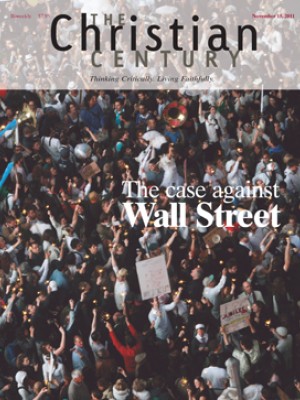Gross inequity
When the Chicago Tribune asked Rahm Emanuel about the Chicago version of Occupy Wall Street, the mayor of Chicago said that although he did not agree with some of the tactics and proposals of the protesters, no one could ignore the fact that many Americans live on the edge of financial disaster. "If you can't hear the anguish in people's lives," he said, "you're too callous for public life."
This issue of the Century includes Gary Dorrien's essay "The case against Wall Street." Not everyone will agree with Dorrien's analysis or proposals. When I asked a New York banker about the situation, he pointed out that if the government had not bailed out the banks, the entire banking system might have collapsed. Automakers avoided total collapse and are back on their feet thanks to government financial support. Americans who might otherwise be unemployed have jobs and incomes thanks to millions of dollars of infrastructure support. My banker friend suggested that the real problem is money in politics and that the number one economic challenge is meaningful tax reform.
Read our latest issue or browse back issues.
Setting our financial house in order is a moral as well as a political and economic matter. As Dorrien observes, the top 10 percent of the American people hold more than 70 percent of the wealth. Historians warn that the growing gap is not sustainable and is likely to result in catastrophe.
I had the pleasure of knowing William J. McDonough, who at one time was CEO of one of Chicago's largest banks. After the Enron accounting scandal and the collapse of the corporation as a result of executive mismanagement and deception, McDonough left banking and became chairman of the Public Company Accounting Oversight Board. In an address titled "The Challenge for Private Sector Leaders," McDonough said that the accounting scandals of the 1990s happened because "many American business leaders got confused and their moral compasses stopped working."
Then, in front of a gathering of Chicago's business and corporate leaders, he addressed the topic of executive compensation. "In 1980, the average large company chief executive officer made 40 times more than the average employee in his or her firm." By 2000, the multiple had risen to at least 400 times. In other words, over the course of 20 years, the CEO pay multiple went up by about 1,000 percent. "There is no economic theory, however farfetched, which can justify that increase," said McDonough. "It is also grotesquely immoral." These would be strong words coming from a theology professor or preacher. They came from a former bank CEO.
The economic crisis hits home to me every week during our church's staff meeting, when we take time to create a list of pastoral concerns: hospitalizations, illnesses and deaths. We discuss each concern and assign someone to follow up. Recently we've added a new category: job loss and unemployment. Our staff's weekly check-in time reminds me that these are urgent matters—and that we must have a solution. Reaching one is likely to require political courage.







